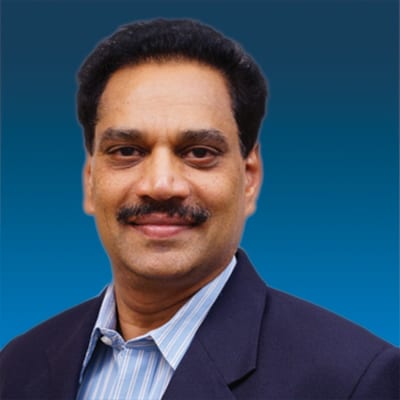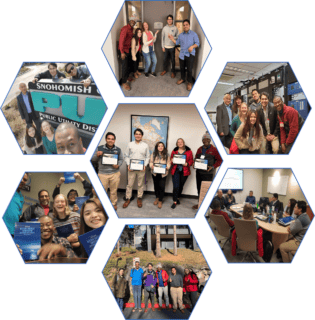
PSC is investing in the power and energy industry’s next generation. Collaborating with Washington State University (WSU) and the University of Washington (UW), PSC Senior Director Dr. Anil K. Jampala hosted the 2023 WSU’s Spring Practicum Program participants. This year’s program included five university students who used the opportunity to: (1) gain more industry exposure and (2) prepare and submit a poster to the 2023 IEEE PES General Meeting Poster Session and Contest.
What happens when you connect academia to industry?
The 2023 Spring Practicum Program aimed to link university students with power and energy industry experts to provide exposure, gauge interest, foster relationships, and provide mentorship.
And that’s precisely what happened.
This year’s program featured three students from UW, two from WSU, and industry guest speakers Dr. Mani Vadari (Modern Grid Solutions), Andrew Mann (Portland General Electric), and Wilson Kazibwe (ISO New England Inc.). The students learned more about the power and energy industry and better understood different work opportunities, typically unavailable through university courses.
But the program offered advantages to the industry too. Companies like PSC can use this type of forum to observe up-and-coming talent while functioning as brand ambassadors for the companies and organizations they represent. Others from PSC were invited to share their knowledge and experience working at PSC and in the industry at large.
A natural outcome of this program is the potential to start investing in the future. One can’t help but consider the possibility of offering internships and/or employment to viable and interested candidates.
A deep dive into the program’s inner workings
The 2023 Spring Practicum Program was held at PSC’s global headquarters in Kirkland, WA, from March 13 – March 17. The focus was electric system operations and the modern grid, for which Dr. Vadari’s book Electric System Operations: Evolving to the Modern Grid provided the perfect backdrop. Each student received a complimentary copy from Dr. Vadari.
The daily schedule was 8:00 AM – 5:00 PM, filled with workshops, break-out sessions, presentations, and a lunch break. Day 1 included welcome, orientation, program logistics and several videos from industry leaders that laid the foundation for the remaining week. Starting on Day 2, several experts from the industry, including PSC, presented their areas of expertise and interacted with the students. Topics from the 2023 program agenda included:
- High-voltage direct current (HVDC)
- Power networks
- Operations
- EMS/SCADA/DTS
- Advanced distribution management system (ADMS)
- Operational technologies security
- Energy markets
- Energy equity
- Policy and regulation
- RFP to contract
- Sales and marketing
- Project management
The program went very well because of the support and cooperation of PSC and industry colleagues, students, and universities.
Harnessing the next generation’s excitement
The 2023 Spring Practicum Program obtained good visibility through social media, and the students’ enthusiasm and interaction marked its success. All five students were on time, focused and engaged.

- PSC Senior Director Philip Jap organized a field trip to Snohomish County Public Utility District (SNOPUD), where SNOPUD Senior OT Engineer Ramona Marino provided a tour.
- PSC Senior Director Dr. Jampala encouraged the students to prepare and submit an abstract for the 2023 IEEE PES General Meeting Poster Session and Contest. By week’s end, the students completed and submitted “The Power Play: Shocking Discoveries from School to Industry.” The poster was officially accepted and is scheduled for a July 2023 presentation at the IEEE PES General Meeting.
The program combined academics and industry experts with real-world, hands-on applications of the students’ learning throughout the week. On Friday, the last day of the program, each student completed a survey and provided a short presentation on what they learned.
Setting the foundation for future programs
Most companies, including utilities, have a lengthy onboarding and training program—typically six to 12 months for new hires. Suppose these companies could leverage summers for students who want to specialize in the industry. That means the students can reasonably be trained over four summers (if starting in their first year of college) to be onboarded quickly right after graduation. Money, time, and energy saved!
The 2023 Spring Practicum Program provided a ripe environment for considering future programs and how to enhance them, including:
- Selecting a program theme to make it easier to organize events around
- Allowing the students to collaborate on a project or report that encourages them to focus and dive deeper into the program theme
- Providing delineated tracks (e.g., career, business, technology, EMS, ADMS) so the students have a more focused selection and path to follow
- Delivering the program to target communities nationally and internationally to attract broader and more diverse talent
- Engaging local industry early to collaborate using field rotations
- Leveraging partner vendors to collaborate with and contribute to the program
While scaling this type of program may present some obstacles, there’s much to be gained from continuing down this path—with improvements and enhancements—to meet various community and industry needs.
Investing in the future is a PSC cornerstone
PSC is familiar with these types of programs. For almost two decades, PSC has supported future engineers worldwide with their education and experience by collaborating with academia, industry partners, educational institutions, and other stakeholders.
In New Zealand, PSC partners with the Aruhiko–Power Engineering Excellence Trust (PEET) to offer scholarships to University of Canterbury and University of Auckland students in their final year. The PSC scholarship was established in 2005 to recognize third-year EEE students’ academic achievement, character, leadership potential, and industry contributions. As a result, several recipients have ended up working for PSC or our clients in multiple countries.
In Australia, PSC has partnered with Monash University Energy Institute to engage in research programs, facilitate student placement, and bring together the best academic, business, and engineering knowledge to address Australia’s national grid challenges.
In Europe, PSC is piloting a mentoring program to increase continuity between older and younger employees. This type of knowledge transfer pairs principal consultants with associate-level employees, bridging the gap between legacy best practices and new ways of managing new technologies.
PSC continues exploring innovative approaches and a more concrete model to evaluate the benefits of knowledge sharing between industry, government, and academia to address some of the industry’s workforce challenges.
